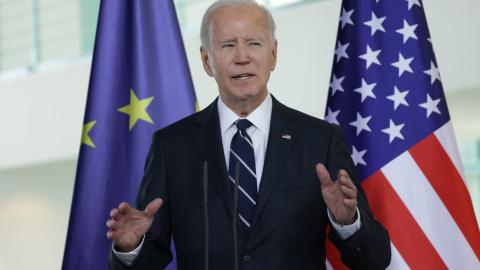The Biden administration last week announced that it granted Ukraine permission to use American weapons to hit Russian military targets inside Russia.
Great. But a less risk-averse administration committed to enabling its ally to repel Russia and end the war quickly would’ve done that from the start.
And the move follows a frustrating pattern of delays and denials, helping Ukraine just enough so it doesn’t collapse but bringing us no closer to the war’s end.
All of which has only fueled Russian (and Chinese) aggression.
Predictably, Team Biden’s announcement elicited a Kremlin condemnation — and a warning that Vladimir Putin lowered the country’s threshold for deploying a nuclear weapon.
Russia also fired an intermediate-range missile at a Ukrainian city and warned it could fire one at any country that helped Ukraine strike Russia.
By making a public announcement of the new policy, the Biden team permitted Russia to blame the United States, its NATO allies and Ukraine for prolonging the war and ratcheting up the aggression.
But that blame goes to Russia, with the notable help of China.
On Tuesday, something cut two undersea fiber-optic data cables — one between Lithuania and Sweden’s Gotland Island, the other between Finland and Germany.
Officials in the affected countries are suspecting Russia. The Danish navy detained a Chinese-registered container ship, which may have cut the Finland-Germany cable as it attempted to leave the Baltic Sea.
This is not the first such incident: In 2023, the Chinese container ship Newnew Polar Bear dragged its anchor across the seabed, breaking a key undersea gas pipeline and two cables connecting Finland and Estonia.
China insists it was an accident, and there has been no official statement by other nations contradicting China’s claim.
But privately, Central and Eastern European officials believe it could’ve only occurred intentionally.
Worryingly, a Russian cargo ship was in the area at the same time the Chinese ship cut the cable, signaling possible complicity in or endorsement of the act.
Although the Europeans are unwilling to name China publicly as a potential culprit, they’ve broadly blamed Russian hybrid warfare.
The foreign ministers of France, Germany, Italy, Poland and Britain issued a statement: “Moscow’s escalating hybrid activities against NATO and EU countries are also unprecedented in their variety and scale, creating significant security risks.”
In June, Russian saboteurs tried to disrupt shipments of weapons to Ukraine by setting fire to a German metal factory. July reportedly saw a foiled attempt by the Russian government to assassinate the CEO of a German arms manufacturer.
In October, Poland closed a Russian consulate, accusing Russia of arson.
The attacks also send a troubling message to the Europeans: You’re on your own.
America’s failure to respond to these incidents signals that the world’s superpower and Europe’s greatest ally is unwilling to help.
Indeed, Roderich Kiesewetter, a member of the German Bundestag, told reporters, “Russia is testing the limits of Article 5” of the NATO treaty — which obligates members to come to each other’s aid if any is attacked — “to stir up uncertainty.”
For all of the recriminations about how President-elect Donald Trump will abandon allies and surrender US global leadership, the Biden administration’s reluctance to even publicly attribute such acts of aggression to their likely culprits, let alone respond to them, has catalyzed more aggression and volatility.
Of course, Europe needn’t wait for the United States. But the US has clear national interests in leading and collaborating with European allies to keep the peace.
Allies must do more to carry the burden of European security, but a coherent strategy works much better with US leadership.
The key is for Washington to both lead and delegate: The collective economic and military strength of the United States and Europe must be marshaled to resist authoritarian revanchism.
Alas, there’s little evidence the Biden administration is even trying to compel its adversaries to cease its hybrid warfare aggression, apparently believing instead any response in this hybrid zone would make things worse.
Yet again and again, we’ve seen this logic proven wrong. China and Russia take US inaction to mean permission to escalate to further their military and political aims.
The Biden team’s tendency to disclose in advance what it will and won’t do to support allies, and its silence in the face of aggression, has exacerbated the mess.
Perhaps Trump’s unpredictability, along with a willingness to use all tools of American power, will jolt our adversaries into believing their best interests are served by backing down.
Enjoyed this article? Subscribe to Hudson’s newsletters to stay up to date with our latest content.




















